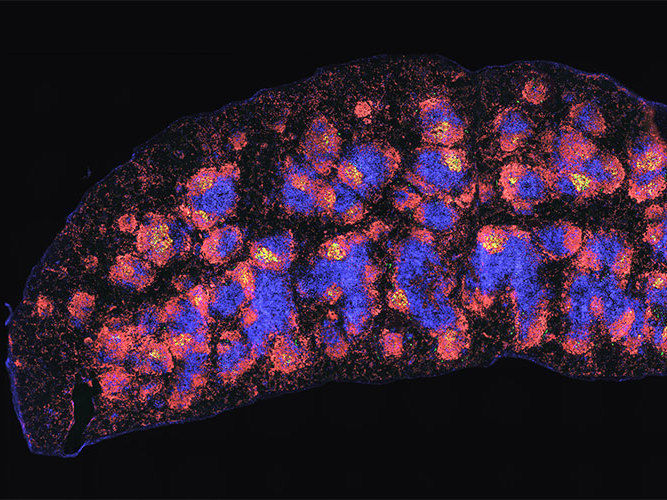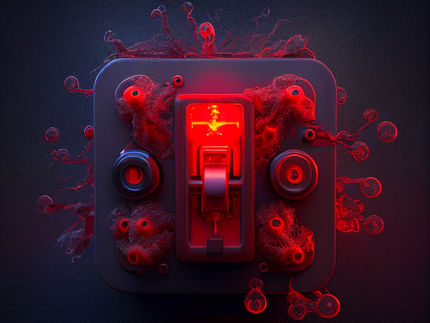Specialized helper cells contribute to immunological memory
Potential for new approaches to immunization
Helper T cells play an important role in the immune response against pathogens. The role of a particular subset of these immune cells was previously unclear. It’s now been shown that T follicular helper cells live much longer than previously thought and contribute to long-term immunity.

Spleen of a mouse with fluorescent antibodies. The yellow areas contain Tfh cells that are involved in maintaining immunological memory.
University of Basel, Department of Biomedicine, Ludivine Litzler
Most vaccines induce specific antibodies that provide life-long defense against infection by pathogens. There are still many infections, however, for which no vaccines are available, including malaria, HIV and tuberculosis. In the ongoing fight against infectious disease, researchers are therefore exploring new vaccination strategies that focus on T cells, which can also provide protection against pathogens.
Immunological memory
T cell targeted vaccination generates long-lived memory cells that remember the pathogen. Following infection, these memory cells are able to multiply quickly and support pathogen clearance. Researchers at the University of Basel focused their studies on a specialized type of T cell: T follicular helper cells (Tfh). These cells interact with other immune cells, providing essential support for antibody production.
Tfh cells are difficult to study in humans as they don’t reside in blood, but mainly in lymph nodes and the spleen, which cannot be sampled routinely. Earlier studies also indicated that Tfh cells fail to make memory in mice, disappearing shortly after an infection subsides.
Surprisingly long-lived Tfh cells
The research group, headed by Professor Carolyn King, has now demonstrated that the disappearance of Tfh cells is largely caused by their susceptibility to death during isolation from the tissue. By treating mice with a small molecule to prevent this, Tfh cells were found to be surprisingly long-lived, persisting for at least 400 days after infection. Unexpectedly, central memory T cells - which have long been considered to be a good target for vaccination - were absent at this time point.
Further investigation showed that the Tfh cells possess stem cell characteristics and continue to support antibody production even at very late time points when the immune response has supposedly died down.
Potential for new approaches to immunization
This better understanding of Tfh cells opens up new prospects for creating long-term acquired immunity: “We hope that these findings regarding the long-term value of Tfh cells will contribute to the development of improved vaccination strategies,” says Carolyn King, from the University of Basel’s Department of Biomedicine, of the results.
Original publication
Marco Künzli , David Schreiner , Tamara C. Pereboom, Nivedya Swarnalekha, Ludivine C. Litzler, Jonas Lötscher, Yusuf I. Ertuna, Julien Roux, Florian Geier, Roman Jakob, Timm Maier, Christoph Hess, Justin T. Taylor, Carolyn G. King; "Long-lived T follicular helper cells retain plasticity and help sustain humoral immunity"; Science Immunology; 2020
Most read news
Original publication
Marco Künzli , David Schreiner , Tamara C. Pereboom, Nivedya Swarnalekha, Ludivine C. Litzler, Jonas Lötscher, Yusuf I. Ertuna, Julien Roux, Florian Geier, Roman Jakob, Timm Maier, Christoph Hess, Justin T. Taylor, Carolyn G. King; "Long-lived T follicular helper cells retain plasticity and help sustain humoral immunity"; Science Immunology; 2020
Organizations
Other news from the department science

Get the life science industry in your inbox
By submitting this form you agree that LUMITOS AG will send you the newsletter(s) selected above by email. Your data will not be passed on to third parties. Your data will be stored and processed in accordance with our data protection regulations. LUMITOS may contact you by email for the purpose of advertising or market and opinion surveys. You can revoke your consent at any time without giving reasons to LUMITOS AG, Ernst-Augustin-Str. 2, 12489 Berlin, Germany or by e-mail at revoke@lumitos.com with effect for the future. In addition, each email contains a link to unsubscribe from the corresponding newsletter.
Most read news
More news from our other portals
Last viewed contents
Trimeresurus_purpureomaculatus_andersoni
Bile_esculin_agar
Pagophagia
Degussa Licenses Genedata's Integrated Bioinformatics Platform to Streamline its Metabolic Engineering Research

Breakthrough in molecular machines - Researchers have succeeded to obtain control of the molecular machines, which in the future may enable them to perform controlled movements

Fiscal 2023: Proven Resilience During Transitional Year - Return to organic growth expected in 2024
Trimeresurus_trigonocephalus
Paul_Pulewka
Electrostatic force takes charge in bioinspired polymers
The last checkpoint to T cell fate
Crouzon_syndrome






















































